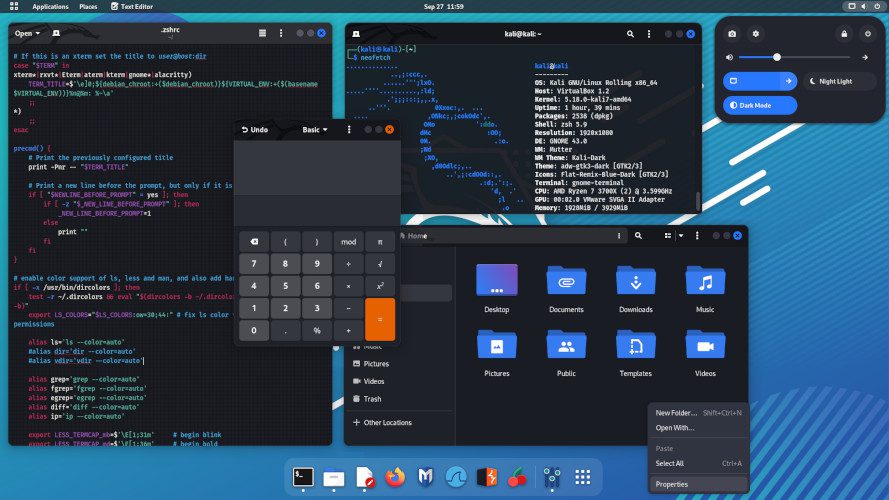Kali Linux, often heralded as a powerhouse for ethical hacking and cybersecurity, has gained notoriety for its extensive suite of tools designed to identify and fortify security vulnerabilities. As more people explore the possibilities of this specialized operating system, a common question arises: Is Kali Linux illegal? In this article, we aim to demystify the legality of Kali Linux and shed light on its intended purpose.

Defining Kali Linux:
Kali Linux is a Debian-based Linux distribution developed explicitly for penetration testing, ethical hacking, and digital forensics. It is not a mainstream operating system like Windows or macOS but serves a niche market of cybersecurity professionals, students, and enthusiasts looking to enhance their skills in securing digital systems.
The Ethical Hacking Paradigm:
The key to understanding the legality of Kali Linux lies in grasping the concept of ethical hacking. Ethical hackers, also known as “white hat” hackers, engage in activities with explicit authorization to test the security of systems, networks, and applications. Kali Linux is tailored to facilitate these ethical hacking tasks, providing a comprehensive toolkit for professionals to identify and rectify vulnerabilities before malicious actors exploit them.
Legitimate Uses of Kali Linux:
-
Penetration Testing: Kali Linux is widely used for authorized penetration testing. Security professionals employ its tools to assess the robustness of networks, identify vulnerabilities, and recommend security measures.
-
Digital Forensics: Kali Linux includes tools for digital forensics, enabling investigators to analyze and recover data from digital devices. This is crucial in solving cybercrimes and gathering evidence for legal proceedings.
-
Educational Purposes: Many educational institutions incorporate Kali Linux into their cybersecurity curricula to provide hands-on experience for students seeking careers in ethical hacking and cybersecurity.
Misconceptions and the Dark Web:
Despite its legitimate applications, Kali Linux is sometimes associated with illegal activities due to its presence on the dark web. It’s essential to differentiate between the tool itself and how it might be misused by individuals with malicious intent. The responsibility lies with the user, not the tool.
Ethical Use: The Key to Legality:
The legality of Kali Linux hinges on how it is used. Authorized, ethical, and responsible use aligns with its intended purpose, while unauthorized and malicious activities are unequivocally illegal. Here are key factors to consider:
-
Authorization: Ethical hacking using Kali Linux requires explicit authorization. Attempting to penetrate systems, networks, or applications without permission is illegal and can lead to severe consequences.
-
Adherence to Laws and Regulations: Users of Kali Linux must operate within the bounds of local laws and regulations. Engaging in any activity that violates privacy laws, data protection regulations, or any other legal statutes is unlawful.
-
Educational and Professional Context: Legitimate use of Kali Linux occurs within educational settings and professional environments where authorized individuals are engaged in ethical hacking tasks for learning or securing systems.
The Legal Standing of Kali Linux:
From a legal standpoint, Kali Linux itself is not illegal. It is an open-source operating system distributed under the GNU General Public License. The legality concerns arise when individuals use the tool for malicious purposes or without proper authorization.
Responsible Use and Community Guidelines:
The Kali Linux community emphasizes responsible use of the operating system. This includes respecting ethical guidelines, obtaining proper authorization, and fostering a culture of knowledge sharing and ethical hacking practices.
Conclusion: Ethical Hacking in Focus
In conclusion, Kali Linux is not inherently illegal; rather, it is a powerful tool with a specific focus on ethical hacking and cybersecurity. Its legality depends entirely on how it is utilized. Ethical hacking, conducted within the boundaries of authorization and legality, is a crucial aspect of bolstering digital security. As individuals explore the capabilities of Kali Linux, it is imperative to approach its use responsibly, adhering to ethical standards and legal frameworks. By doing so, users can harness the power of Kali Linux for its intended purpose — securing the digital landscape through ethical and authorized practices.